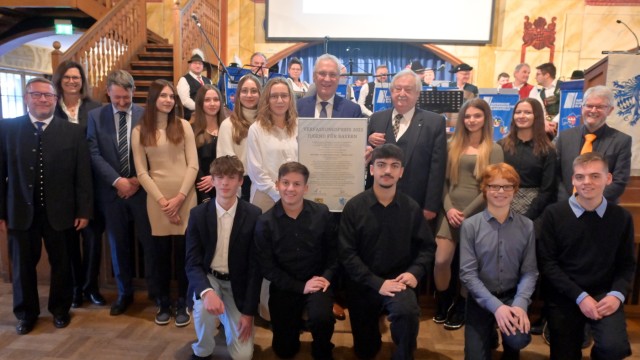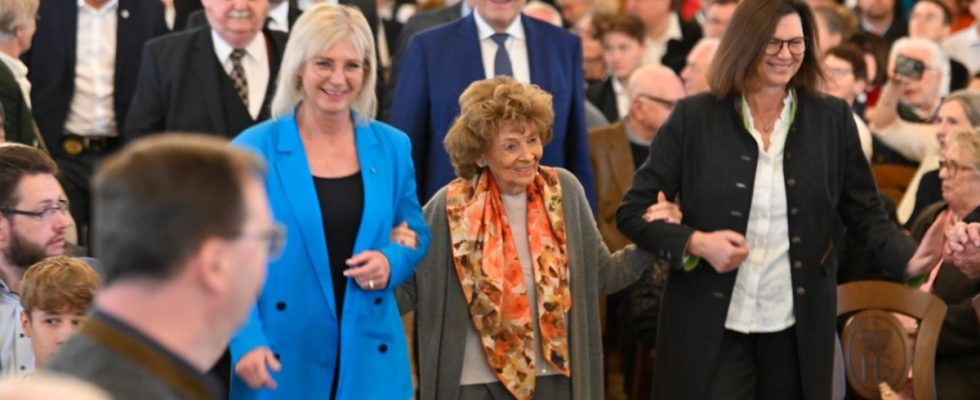It used to be completely normal for a man to raise his hat when greeting someone. Today this custom has disappeared, also because the number of classic hat wearers is shrinking. That’s why it was quite noticeable that Ludwig Prince of Bavaria, the future head of the House of Wittelsbach, lifted his Jagerish headgear in front of the entrance to the Munich Hofbräuhaus when he saw State Parliament President Ilse Aigner and State Minister Ulrike Scharf there and greeted the two women in a friendly manner.
The encounter did not come about by chance. As at the beginning of every December, the constitutional celebration initiated by the non-partisan association “Bavarian Unification/Bavarian People’s Foundation” was celebrated in the ballroom. In memory of the fact that the Bavarian Constitution was adopted by vote on December 1, 1946. This constitution not only forms a central political foundation for the Free State. It is also an independent barb in the web of German federalism and European centralism.
The fact that the highly praised Bavarian Constitution is an integral part of the community was often emphasized at the celebrations. Even if many people in Germany feel largely safe, the world is still full of crises. “Is our democracy in danger?” was the core question of the constitutional celebration.
This question alone shows the difficulties of current developments, said Interior Minister Joachim Herrmann (CSU) in his welcoming speech. There is an increase in extreme spectrums and attempts to divide the country and destabilize democracy. Herrmann said that he still looks to the future with confidence, because most people appreciate the values of liberal democracy.
State Parliament President Ilse Aigner (CSU) rejected the populist criticism that democracy would no longer work. Even if one always has to keep in mind the failure of the first parliamentary democracy in the Weimar Republic, there is “no better political system in the world than our liberal democracy.”
The mayor’s band organized the celebration in the fully occupied ballroom in Munich’s Hofbräuhaus.
(Photo: Claus Schunk)
This was also underlined by the musical accompaniment, which led Aigner to remark that something as wonderful as the mayor’s band only existed in Bavaria. Beyond the universally appreciated brass music, the question was raised whether a constitutional celebration belonged in the Hofbräuhaus. Absolutely, one could reply, ultimately it is even a parade place for democracy. After all, a resolute waitress there once gave the revolutionary and world’s greatest anti-democrat Vladimir Ilyitish Lenin a good slap.
Professors Hermann Rumschöttel and Ludwig Hoegner from the Presidium of Bavarian Unification, who steered the event on behalf of the seriously ill President Florian Besold, were also mindful of this history. Rumschöttel called Besold “the mainstay of the constitutional celebration” and he praised him as an “eloquent representative of Bavarian constitutional patriotism.”
There was also a sense of melancholy, which became evident when the mayor’s band sang the song about the Bohemian wind, which “will still blow long after we are no longer there.” Just at that hour, a spur of the gust of wind actually brought snow and cooling, which paralyzed the entire city hours later.
In her speech, Ursula Münch, Director of the Academy for Political Education, dedicated herself to protecting liberal democracy in times of digital manipulation. She explained how much so-called social media changes everything that is familiar, but is still attractive for people, not least for extremists. Their work has the potential to undermine the fundamental pillars of democracy. The best way to arm yourself against disinformation “is to promote people’s maturity, explain the mechanisms of such media and strengthen trust in the constitution and in the ability of democratic institutions to act.” Especially because refuting fake news requires much more energy than producing it, as Münch said.

The students of the Dossenberger-Gymnasium Günzburg received the Constitutional Prize “Youth for Bavaria”. It was presented to them by Interior Minister Joachim Herrmann (behind) and Professor Herrmann Rumschöttel (to the right).
(Photo: Claus Schunk)
This time, the Constitutional Prize “Youth for Bavaria” went to students from the Dossenberger-Gymnasium in Günzburg. For 25 years you have been running a learning circle that is unique in Germany, a showcase project for the values and content of the Bavarian Constitution. Ninth graders instruct elementary school students in projects on the topic of “Jewish life in Bavaria.” So far, 25,000 primary school students have taken part in this learning circle. “An anti-Semitism prevention project” in the best sense, as it was said in the laudatory speech.
At the end of the celebration, the musician Monika Drasch performed Articles 117 and 131 of the Constitution in song form. It was a touching, if unusual, presentation of these texts, which formulate the values of democracy, but also the obligations that arise from it.
The constitutional celebration ended with the singing of the Bavarian anthem, at which the assembly then sang the European verse, which was developed by students from Bad Tölz in 2012 during a Bavarian Unification competition – further evidence that the constitution also reaches young people.

